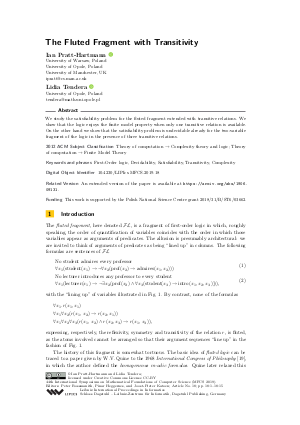The Fluted Fragment with Transitivity
Authors
Ian Pratt-Hartmann  ,
Lidia Tendera
,
Lidia Tendera 
-
Part of:
Volume:
44th International Symposium on Mathematical Foundations of Computer Science (MFCS 2019)
Part of: Series: Leibniz International Proceedings in Informatics (LIPIcs)
Part of: Conference: Mathematical Foundations of Computer Science (MFCS) - License:
 Creative Commons Attribution 3.0 Unported license
Creative Commons Attribution 3.0 Unported license
- Publication Date: 2019-08-20
File

PDF
LIPIcs.MFCS.2019.18.pdf
- Filesize: 0.69 MB
- 15 pages
Document Identifiers
Related Versions
-
An extended version of the paper is available at https://arxiv.org/abs/1906.09131.
Subject Classification
ACM Subject Classification
- Theory of computation → Complexity theory and logic
- Theory of computation → Finite Model Theory
Keywords
- First-Order logic
- Decidability
- Satisfiability
- Transitivity
- Complexity
Metrics
- Access Statistics
-
Total Accesses (updated on a weekly basis)
0Document
0Metadata
Abstract
We study the satisfiability problem for the fluted fragment extended with transitive relations. We show that the logic enjoys the finite model property when only one transitive relation is available. On the other hand we show that the satisfiability problem is undecidable already for the two-variable fragment of the logic in the presence of three transitive relations.
Cite As Get BibTex
Ian Pratt-Hartmann and Lidia Tendera. The Fluted Fragment with Transitivity. In 44th International Symposium on Mathematical Foundations of Computer Science (MFCS 2019). Leibniz International Proceedings in Informatics (LIPIcs), Volume 138, pp. 18:1-18:15, Schloss Dagstuhl – Leibniz-Zentrum für Informatik (2019)
https://doi.org/10.4230/LIPIcs.MFCS.2019.18
BibTex
@InProceedings{pratthartmann_et_al:LIPIcs.MFCS.2019.18,
author = {Pratt-Hartmann, Ian and Tendera, Lidia},
title = {{The Fluted Fragment with Transitivity}},
booktitle = {44th International Symposium on Mathematical Foundations of Computer Science (MFCS 2019)},
pages = {18:1--18:15},
series = {Leibniz International Proceedings in Informatics (LIPIcs)},
ISBN = {978-3-95977-117-7},
ISSN = {1868-8969},
year = {2019},
volume = {138},
editor = {Rossmanith, Peter and Heggernes, Pinar and Katoen, Joost-Pieter},
publisher = {Schloss Dagstuhl -- Leibniz-Zentrum f{\"u}r Informatik},
address = {Dagstuhl, Germany},
URL = {https://drops.dagstuhl.de/entities/document/10.4230/LIPIcs.MFCS.2019.18},
URN = {urn:nbn:de:0030-drops-109626},
doi = {10.4230/LIPIcs.MFCS.2019.18},
annote = {Keywords: First-Order logic, Decidability, Satisfiability, Transitivity, Complexity}
}
Author Details
- University of Warsaw, Poland
- University of Opole, Poland
- University of Manchester, UK
Funding
This work is supported by the Polish National Science Centre grant 2018/31/B/ST6/03662.
References
-
H. Andréka, J. van Benthem, and I. Németi. Modal languages and bounded fragments of predicate logic. Journal of Philosophical Logic, 27(3):217-274, 1998.

-
F. Baader, D. Calvanese, D. L. McGuinness, D. Nardi, and P. F. Patel-Schneider, editors. The Description Logic Handbook: Theory, Implementation, and Applications. Cambridge University Press, 2003.

-
E. Börger, E. Grädel, and Y. Gurevich. The Classical Decision Problem. Springer, 1997.

-
D. Danielski and E. Kieron̈ski. Finite Satisfiability of Unary Negation Fragment with Transitivity. In Proceedings of MFCS 2019, volume 138, pages 17:1-17:15, 2019.

-
E. Grädel, P. Kolaitis, and M. Vardi. On the decision problem for two-variable first-order logic. Bulletin of Symbolic Logic, 3(1):53-69, 1997.

-
A. Herzig. A new decidable fragment of first order logic. In Abstracts of the 3rd Logical Biennial Summer School and Conference in Honour of S. C.Kleene, June 1990.

-
Y. Kazakov and I. Pratt-Hartmann. A note on the complexity of the satisfiability problem for graded modal logic. In Logic in Computer Science, pages 407-416. IEEE, 2009.

-
E. Kieroński, J. Michaliszyn, I. Pratt-Hartmann, and L. Tendera. Two-variable first-order logic with equivalence closure. SIAM Journal on Computing, 43(3):1012-1063, 2014.

-
E. Kieroński and M. Otto. Small Substructures and Decidability Issues for First-Order Logic with Two Variables. Journal of Symbolic Logic, 77:729-765, 2012.

-
E. Kieroński and L. Tendera. On finite satisfiability of two-variable first-order logic with equivalence relations. In Logic in Computer Science, pages 123-132. IEEE, 2009.

-
R. Ladner. The computational complexity of provability in systems of modal propositional logic. SIAM Journal on Computing, 6:467-480, 1980.

-
A. Noah. Predicate-functors and the limits of decidability in logic. Notre Dame Journal of Formal Logic, 21(4):701-707, 1980.

-
I. Pratt-Hartmann. Finite satisfiability for two-variable, first-order logic with one transitive relation is decidable. Mathematical Logic Quarterly, 64(3):218-248, 2018.

-
I. Pratt-Hartmann, W. Szwast, and L. Tendera. Quine’s fluted fragment is non-elementary. In 25th EACSL Annual Conference on Computer Science Logic, CSL, volume 62 of LIPIcs, pages 39:1-39:21. Schloss Dagstuhl - Leibniz-Zentrum fuer Informatik, 2016.

-
I. Pratt-Hartmann, W. Szwast, and L. Tendera. The fluted fragment revisited. Journal of Symbolic Logic, 2019. (Forthcoming).

- I. Pratt-Hartmann and L. Tendera. The fluted fragment with transitivity. ArXiv, 2019. extended version of MFCS'19 paper. URL: https://arxiv.org/abs/1906.09131.
-
W. C. Purdy. Fluted formulas and the limits of decidability. Journal of Symbolic Logic, 61(2):608-620, 1996.

-
W. C. Purdy. Complexity and nicety of fluted logic. Studia Logica, 71:177-198, 2002.

-
W. V. Quine. On the limits of decision. In Proceedings of the 14th International Congress of Philosophy, volume III, pages 57-62. University of Vienna, 1969.

-
W. V. Quine. The variable. In The Ways of Paradox, pages 272-282. Harvard University Press, revised and enlarged edition, 1976.

-
S. Schmitz. Complexity hierarchies beyond Elementary. ACM Transactions on Computation Theory, 8(1:3):1-36, 2016.

-
D. Scott. A decision method for validity of sentences in two variables. Journal of Symbolic Logic, 27:477, 1962.

-
W. Szwast and L. Tendera. On the satisfiability problem for fragments of the two-variable logic with one transitive relation. Journal of Logic and Computation, 2019. Forthcoming.

- L. Tendera. Decidability frontier for fragments of first-order logic with transitivity. In Proceedings of the 31st International Workshop on Description Logics co-located with 16th International Conference on Principles of Knowledge Representation and Reasoning (KR 2018), 2018. URL: http://ceur-ws.org/Vol-2211/paper-02.pdf.
-
M. Vardi. On the complexity of bounded-variable queries. In Proceedings of the Fourteenth ACM SIGACT-SIGMOD-SIGART Symposium on Principles of Database Systems, pages 266-276, 1995.

